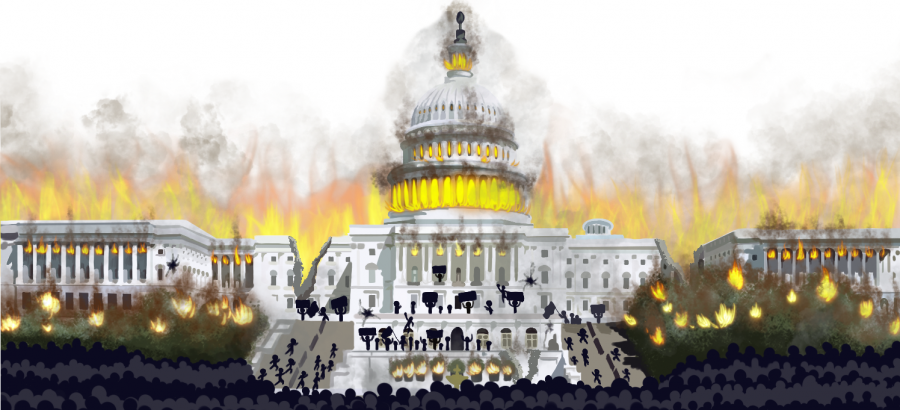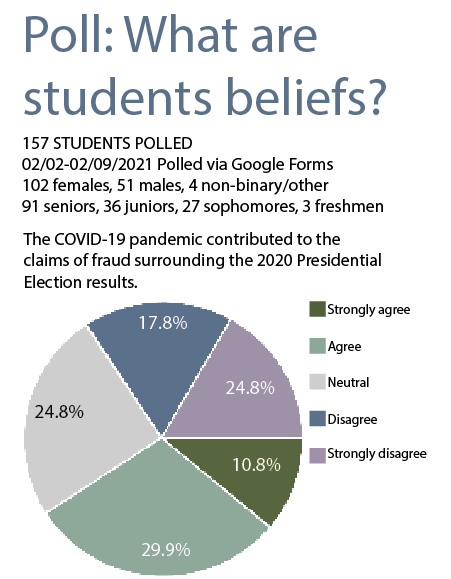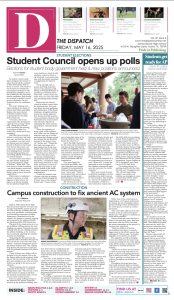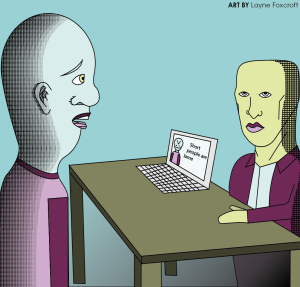Rising Unrest
Students and faculty discuss the social and political culture that contributed to the riot at the U.S. Capitol building on January 6
On January 6 a violent mob of insurrectionists stormed the United States Capitol while it was in session to certify the electoral votes for the 2020 Presidential election.
April 21, 2021
On January 6 a violent mob of insurrectionists stormed the United States Capitol while it was in session to certify the electoral votes for the 2020 Presidential election. Reported and fact-checked by USA Today, the mob was largely made up of Trump supporters who believed that the election was fraudulent and being “stolen” from former-President Trump. The events of the day brought to light some of the more pressing issues regarding the political climate and social culture in the U.S.
ECHO CHAMBER
Popular social media platforms such as TikTok, Twitter, and Instagram use algorithms to curate feeds that pertain to individual user’s interests, which allow users to find and enjoy content that relates to them and their experiences. According to senior Keaton Johnson, this phenomenon has very negative political consequences that displayed themselves on January 6.
“While on social media, people have an algorithm that curates information for them that plays towards their own biases,” Johnson said. “For example if you’re left leaning on social media, you are exposed to a lot of very left bias articles and information, and this happens on both sides. As we’ve been taking in sources that are curated for us by algorithms to get the most views, we continue to be pulled apart, making us more prone to disagree and fight.”
Confirmation bias is the tendency for individuals to seek out and favor information that confirms their values, beliefs or hypothesis on a certain subject. This type of bias can be seen on social media outlets as they have become a common way for people to share their political opinions and find like-minded individuals to communicate with online.
“With so much information out there it is easy to find information that fits our own narrative,” government teacher Dalton Pool said. “And because so many people naturally seek sources and information that reconfirm what they believe we are left with a bunch of ideological bubbles that struggle to even agree upon basic facts.”
According to Thompson, the events of January 6 emphasized the dangers of those ideological bubbles and the echo chamber that results from confirmation bias.
“The insurrection at the Capitol on the 6th made clear the dangers of polarization,” Thompson said. “Many of those rioting lived in a completely different world than the rest of America. They truly believed that America was under attack, that the election was stolen, and that they were saving America because of how entrenched they were in the Trump campaign’s propaganda. In a nation with less polarization, or at least less hateful polarization, they would have been more open to believe sources that presented information they didn’t agree with.”
FAKE NEWS MEDIA
In a study done by the Center for Web-Using, Republican voters have grown increasingly alienated from established news sources. Social media has become a popular way for people to receive information, according to Pool this phenomenon has negative consequences regarding media credibility.
“The main thing social media has done is decentralize information,” Pool said. “Now, instead of most Americans getting their news from a few mostly reliable sources, we are getting our information from the most shared and liked social media posts. And the bad thing about social media is whether or not something is liked or shared doesn’t necessarily correlate with how credible the source is.”
In the study conducted by the Center for Web-Using, it was found that out of the 30 political news outlets given, Republicans polled distrusted more than they trusted 20 of the given media outlets. Only seven of the sites surveyed had a higher trust ratio for Republicans, including Fox News and radio broadcasts from Fox News host Sean Hannity and Rush Limbaugh.
“I think that by instilling the deep distrust in the media that said negative things about [Trump] it helped get his followers to the place they are now,” Thompson said. “When all that they trust is the media that is entirely supportive of Trump, how could they not believe the information he is saying? It is basically a media machine created to develop an alternate world where everything that Trump says is true.”
According to Harvard University, education is an important cornerstone to every Democracy. Pool believes that misinformation is dangerous to this cornerstone.
“By discrediting the media and spreading misinformation former President Trump made it difficult for people to decipher the facts,” Pool said. “This is dangerous in a Democracy because a Democracy works best when we have an educated electorate that can make logical decisions at the voting booth. When basic facts can’t be agreed upon our decisions as an electorate become less and less logical.”
POLITICAL CLIMATE
Part of a healthy Democracy is the ability to respectfully debate policies and come to a conclusion that benefits the majority without severely harming the minority. According to Pool, this ability to have respectful debates is handicapped by misinformation.
“What is unfortunate is that the current spread of misinformation, coupled with how we interact and communicate with each other in a digital age, are limiting our ability to have a healthy debate and then take action based on what the majority of the country wants,” Pool said.
Political polarization is the divergence of political attitudes to ideological extremes. Pool believes that political polarization is the result of the fast-paced change that society has experienced over the last years.
“We are more politically polarized today than we have been since the 1960s,” Pool said. “Social Media is a big reason for the polarization. But another overlooked reason is just how fast our society is changing. How our country and our communities adapt to this change is a difficult endeavor and the fact that we can’t agree upon the best way forward is very much reflected in our politics.”
According to Thompson, the idolization of politicians is a phenomenon that instills a deep personal connection to politics that is centered around an individual instead of the policies that a politician plans to enact.
“I think that the main issue with idolizing politicians is that it makes politics, and by extension government, about the person rather than actually governing,” Thompson said. “It leads to an infective government where representatives spend more time grandstanding instead of doing the job they were elected to do. It also enhances political polarization and tribalism by adding a personal connection to politics. When a candidate someone idolizes loses, they feel like they lost too.”
Politicians are elected officials that are given their power by the people that voted them into office. Senior Alina Watson believes that the actions of politicians should be viewed critically by all sides.
“If anybody should be at the mercy of the people, it’s [politicians],” Watson said. “Politicians should be the ones that we as a people are critiquing and looking at constantly, and staying educated on who’s representing us.”
Idolizing politicians is a limiting factor in American politics, according to the Independent. Johnson believes that the idolization of politicians inhibits the American people’s ability to think critically about politics.
“I think it’s horrible how we idolize politicians, because it teaches us not to think for ourselves,” Johnson said. “The main issue with idolization in regards to Trump and some of his supporters is that they just followed whatever he said and didn’t do their own research to see if the claims he was making were actually true. This trend is causing problems for people on both sides of the aisle, not just Republicans. If people don’t start to think for themselves then tensions are just going to get worse.”
THE AFTERMATH
Divisive rhetoric from politicians has been cited as one of the main driving factors for the insurrection.
“The riot at the capitol made it very clear that what leaders say have far-reaching impacts,” Thompson said. “Representatives must take care to speak the truth, and to do so in a way that doesn’t foster hatred in those listening.”
Watson believes that in the wake of tragedy, there is hope for the future, and that education is the key to mending society and cooling the political climate.
“I hope that people can move past the party system, and vote for people who they believe in rather than just blue or red,” Watson said. “But I think the best thing that an individual person can do is be educated and exercise their right to vote. I believe that when society starts to mend, then hopefully the political system will follow.”
According to Thompson, the events of January 6 brought to light the divergent elements of American politics, and has given Americans an opportunity to mend them and move forward.
“I think the first step is finding that solid foundation to agree upon, whether that is core values or a specific issue to unite on,” Thompson said. “We just have to have some common ground on which debates can be built upon. It serves as a foundation of respect for each other and cooperation for the same goal. Additionally, there needs to be a certain level of willingness to let others live the way they want to live as you do the same. Not everything has to be a federal issue where there is a one-size-fits-all plan for everyone.”
After the rioters at the capitol were dispersed and the situation was stabilized, Congress reconvened to certify the election results and do their Constitutional duty.
“The Capitol riot shows both the strength and fragility of our system,” Thompson said. “Democracy is not the norm for humans. For a millennium, the strongest ruled and the weak died. We have a nation that rejects those ideals, in pursuit of a world where everyone has a voice. The rioters fell back into human nature, and tried to use force to gain power. I have hope that, given time, the riot can become a warning of the dangers of polarization, and a reminder that even if we disagree with someone, there is nothing good that can come from hating them.”











